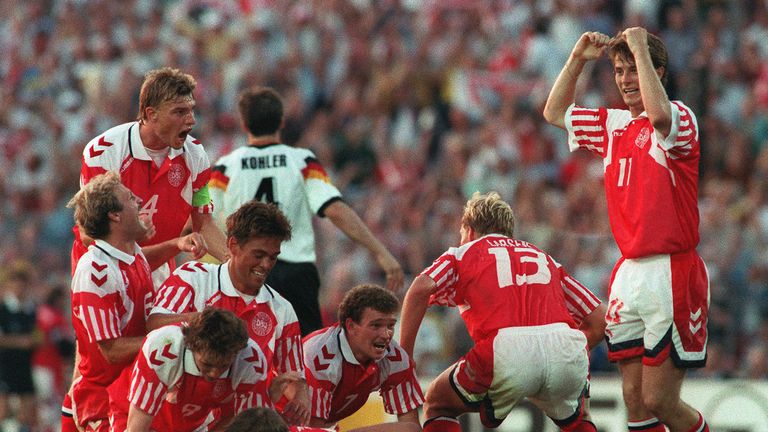The back-pass rule 25 years on - how has the Premier League benefited?

Thursday 10 August 2017 18:14, UK
25 years since the introduction of the back-pass rule, we look at how the Premier League has benefited from one of the most popular law changes in the game.
Italia '90 is fondly remembered by those old enough to have witnessed it. From Paul Gascoigne's tears, two enthralling semi-finals settled by penalties, Diego Maradona breaking Brazilian hearts and Roger Milla's dancing - so many iconic moments that have stood the test of time.
What many football romantics often forget, however, is just how tedious some of the football was at that tournament, where an average of 2.2 goals per game remains an all-time low for a World Cup. Action was needed to ensure excitement levels were improved and, two years later, the rule-change widely regarded as the most successful ever came into place.
It felt like the perfect timing. The shiny new Premier League in its current guise was born, and immediately goalkeepers were banned from collecting back-passes from defenders into their waiting arms. Entertainment was sure to follow.
The anticipation of the new law only intensified as time wasting played a huge part of Denmark's success at Euro 1992.
Sure enough, the Premier League thrilled a wider audience right from the off, but not initially simply because football had returned to its high-octane past - goalkeepers just couldn't cope.
Long before the days of Pep Guardiola signing a goalkeeper for his ability on the ball over his shot-stopping, 'keepers used to hoofing the ball upfield from a goal-kick or out of their hands were suddenly faced with strikers thundering into their box to close them down. Now, they had to be able to react quickly with their feet, not just with their hands.
Some comical incidents ensued. Less than a month into the Premier League's debut campaign, the ball was rolled back to Sheffield United goalkeeper Simon Tracey against Tottenham at White Hart Lane and what followed was incredible, as Tracey took two awful touches, wrestled the ball from a ball boy, before dragging Spurs' Steve Sedgley to the ground. A red card compounded everyone in attendance's bewilderment.
After the initial teething problems, forcing goalkeepers to adjust, the rule helped the flow of the game and soon became the change the governing bodies thought it would become.
While the nuances of the offside rule have wavered over the years, debate still rages on as to what is deliberate handball and what isn't, a back pass has remained a back pass. While there have been a few incidences of defenders being penalised for passing the ball back accidentally, on the whole, the intentions of a back pass are ostensibly clear.
There has been no budging on the change. FIFA rules state that "no trickery may be used to get around the terms of the amendment to Law 12". No skulduggery can skirt around the law change, just ask Marco Verratti, who was penalised for heading the ball back off the floor for Paris Saint-Germain last season.
"I think certain goalkeepers from my era would probably struggle with the way the game is today," former Manchester United goalkeeper Peter Schmeichel told FIFA.com. "But it is like anything, you try to compare teams from ten or 20 years ago and it is impossible. There are more, high-quality goalkeepers now."
25 years on, and the Premier League has evolved into the most-watched league in the world. The quality of the football is as intense as ever, with even more of the world's best talent arriving to enhance viewing yet further.
The more time the ball is in play, the more we can be entertained, and the impact of the back-pass rule in such an occurrence cannot be overlooked.
Jordan Pickford's flat-trajectory long passes would have been a very rare commodity 25 years ago, as would slick passing moves started from deep. Football has improved - sometimes the authorities do get it right after all.







